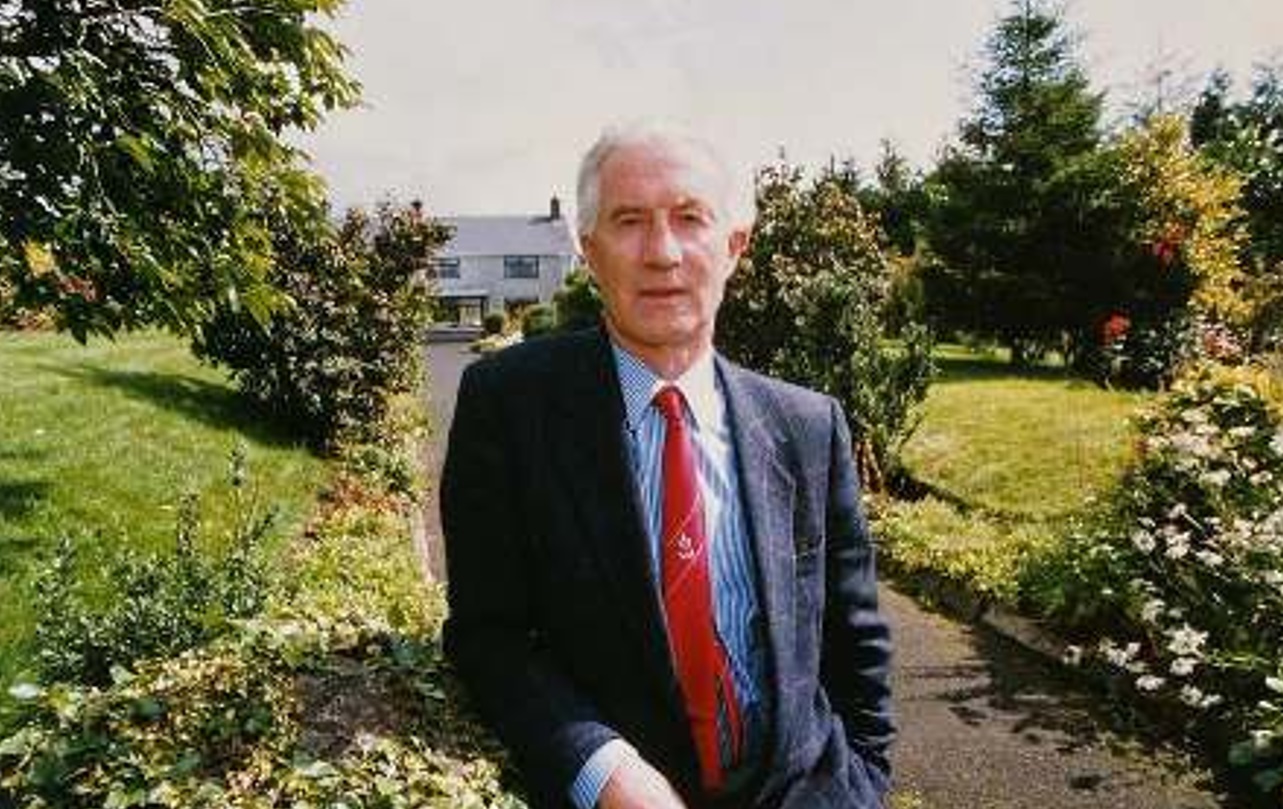Jim McKeever was one of the all-time greats. A book, including many of his own words, will be launched next week
By Michael McMullan
JIM McKeever was one of the greatest footballers of all time. He captained Derry to the 1958 All-Ireland final in a season where he was honoured as player of the year.
He managed the county to Ulster glory and served as Derry GAA chairman. A native of Ballymaguigan, he also played for neighbours Newbridge,
Further afield, he is synonymous with coaching and in his role with ‘The Ranch’ in Belfast, he shaped many of the future coaches and managers in the game.
Writer Seamus McRory had appealed to McKeever to put pen to paper to recall his story.
And he did. McKeever passed away last year and his daughter Maeve has helped McRory, Seán Bradley, Jimmy Smyth and Peter Finn pull together a new book entitled ‘Only the sky above’ which will be a must for all Gaels in Derry, Ulster and beyond.
Gaelic Life have some extracts from the book which will be launched next Thursday in McKeever’s native club Ballymaguigan
The first extract dates back to the 1940s and an unbeaten Newbridge sevens team that helped McKeever’s football development. He takes up the story…
***
THAT Newbridge seven-a-side team of 1948 was an excellent group of footballers which goalkeeper John Murphy later researched and had a special framed picture prepared for us with the title ‘’The Team That Was Never Beaten’’ which hangs in my home.
Every player had represented Derry and three played for Ulster. John rated our best display as winning a 32-team tournament at Kilrea, having conceded only two fifties throughout.
To avoid delays, fifties in our seven-a-side games were not taken but were counted to decide the winner in a drawn game. He identified our nearest defeat in that summer as against Castledawson, at their own sports day, when at half-time in a ten minute each way game, we were losing 3-1 to nil. We scored 3-2 in the second half without conceding any, to win by a point.
The ten-minute half may seem short but we experienced much shorter time allocations. Seven-a-side tournaments could only begin around five o’clock in the afternoon since clubs would have league games earlier in the day. So even if two [and occasionally more] shortened pitches were in use for separate matches, the number of games required, when up to twenty teams might be entered, allowed a very short time for each. The shorter evenings at the end of summer further reduced time for games and I recall semi-finals and finals being allocated two and a half minutes each way. In these circumstances we quickly learned the value of early scores and the need to avoid silly concessions of scores or frees.
Tactical thinking was important as time allocation and fading daylight greatly reduced the possibility of ‘comebacks’. The choice of direction, if we won the pre-match toss, was, in falling darkness, often determined by the position of dodgems, when the lighting system provided a degree of flood-lighting at one end of the pitch. We always opted to defend that end in the first half and to attack it in the second half when we hoped the increased darkness would hamper the opposition attackers while allowing us a semi-lit target! The referee’s task in these circumstances was largely guesswork but I do not recall any major problems arising. Everyone seemed to enter into the spirit of the occasion. Our half-back, Joe Donnelly, in one final, is alleged to have gone on a solo-run at surprising speed, in semi-darkness, by bouncing the ball every four steps on his forearm undetected by the referee and scoring the winner for us! Though I played in the game I have no idea if that is true.
I can recall with certainty that on one occasion, before a final against Castledawson, we were instructed by our captain, Roddy, to score only goals. The reasoning was sound. Sonny McCann was in goals for the opponents. He was a splendid footballer who played at halfback for Derry and Ulster and was especially renowned for his accurate long free kicks. In the short seven-a-side pitch he scored points from kick-outs. So if we scored a point he would score from the kick-out. To get ahead in the game we had to score goals; against no other team were points worthless.
I believe that my seven-a-side experience in that summer had a considerable influence on my playing career. It taught the need for a sense of urgency from the start of the game, the capacity to think of the whole team not merely a section of it, not the forwards or midfield or defence only; the need always to move so as to offer options to the player with the ball; and an appreciation of tactical play to impede or exploit the opposition. The importance of game skills were reinforced, especially ball winning, accurate delivery to the advantage of colleagues, and reliable score-taking. There was rarely time to recover from mistakes.
I vividly recall playing at the Kilrea tournament on the right wing and fielding a ball crossed from the left. I had a clear path to goals about thirty yards out and sprinted straight in that direction. A back moved across to intercept me and Roddy Gribbin sprinted up the centre on his own. I allowed the back to within two yards of me and shot for goals even though he had narrowed my target. The ball hit the post and went wide. Roddy though a little further out was in the perfect position to receive a pass for a clear shot at goal. He forcefully let me know what I should have done and I do believe I never made that mistake again. With the smaller number of players, the essence of such a common situation is more easily grasped and of course emphasises the benefit of small-sided games for young players.
***
Upon retiring from St Mary’s, McKeever attended a function held in his honour. Here is his speech…
TONIGHT is a celebration really, more than marking an end of an era; not of departure but of achievement, good fortune and fond memories. My association with St Mary’s goes back to its foundation. St Mary’s played one of its first games against St Malachy’s in the MacRory team. I was injured and was referee. I awarded (impartially) a penalty at the end of the game and was immediately enveloped in a protest led by a linesman, and I climbed down.
Thus former INTO General Secretary, Gerry Quigley, had his first success in organised protest, and his first step in career success! Amongst the protestors was the goalkeeper that day, my club and county colleague and former Ulster and Combined Universities player, and my passenger this evening, Mick Gribbin.
As students we had good times, much of it revolving around our team. It was a more paternalistic era, so we did not want for advice or supervision.
Mick Gribbin in a memorable and revealing speech, recalled the advice when confronted with certain ladies in downtown Belfast to ‘forget our manners and run’. I admit that I had forgotten that one. But I do remember advice against speculating our meagre grant on ‘predicting the relative velocities of equine or canine quadrupeds!’
We organised our own football, but quite seriously. In 50-51 I was vice-captain and Malachy McEvoy was captain. At his funeral the recently retired chairman of NIHE, who was a wing back on the team reminded me of us calling on a Sunday morning to collect him for a game. He had just finished an all-night poker game. We told him what we thought of his attitude to playing and told him to stick to his poker!
I joined the staff in 1957, and got involved in football. Even before I was ready, Fr McEnaney, the original ‘fixer’ and a member of staff, sent along the captain and vice-captain of the college’s football team – Sean O’Connell (My future playing colleague with Derry) and Seamus Mallon (future Deputy leader of SDLP and Deputy First Minister.) to me.
We managed to fix training on the grazing field, and in the first session Denis Niland was injured. We played in the Antrim Leagues, had good teams but never won. We were not popular in these leagues, neither were QUB.
1968-69 was historic, when we gained entry into the higher education competitions, including the Ryan Cup and Super League. For the next dozen years we had a series of great teams from the peak of college numbers and since then the more occasional good performances. Disappointments included the first Ryan Cup decider when we were defeated in a replay by Maynooth. It was a great team and a great achievement to get so far.
In the next chapter I will recount in greater detail how St Mary’s finally achieved the Holy Grail of third level Gaelic football by winning the coveted Sigerson Cup.
After the high of the Sigerson ‘89, team we went on to reach the Sigerson ’90 final but our luck went awry. We had the best team, but everything went against us. But we learn from defeats. They are a point of human experience. This reminds me of the Ernest Hemmingway quote ’Man can be beaten but not defeated’.
St Mary’s has had a beneficial effect on many of its members. I am conscious that we operated at the source of a river of influence; conscious of the effects throughout the province and further afield. There is great satisfaction in seeing the unfolding of more mature and confident personalities.
My thirty-five years in college seem like a series of revolutions, in faculty, structural changes, student numbers and attitudes. Some had a positive effect, some a negative effect. But the football club team has remained a constant. Teams create a constant pressure in time and can be unstable. But the gains are worthwhile. For me it allowed me to resolve some doubts and problems in regard to coaching and to witness the beneficial effects on members which I’m sure they are aware of.
I have enjoyed immensely the personal contact with great players of the province over that period, from Sean O’Connell to Peter Canavan and Seamus Downey, and oceans of great players in between.
There is an opportunity to learn what cannot be found in books. This is to live in sympathy with and show loyalty to others, and to be better human beings.
- ‘Only the sky above me’ will be launched on Thursday, November 21 at 7.30pm in St Trea’s Ballymaguigan and on Saturday, December 7 at 12noon in St Mary’s University College in Belfast
Check out the latest edition of Gaelic Lives, a feature interview with Jimmy Smyth and Seán Bradley chatting about the legacy of Jim McKeever.
Receive quality journalism wherever you are, on any device. Keep up to date from the comfort of your own home with a digital subscription.
Any time | Any place | Anywhere













